Interview with the organizers of Databeers
Fecha: 10-09-2019
Nombre: Marcelo Soria Rodríguez y María Sánchez
Sector: Science and technology
Organismo, Institución o Empresa: Databeers
País: Spain
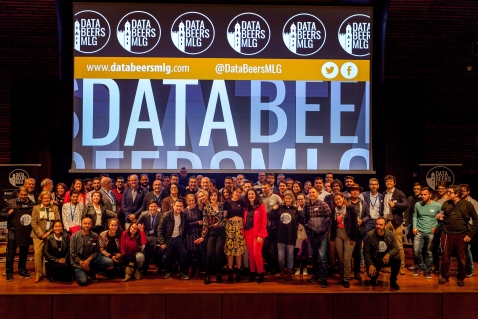
Databeers is a non-profit initiative specializing in dynamic events focused on different areas related to the data universe. The objective: to disseminate issues related to data, so fashionable and so habitually plagued with common places, myths and some confusion.
Datos.gob.es have talked with Marcelo Soria Rodríguez and María Sánchez, organizers of Databeers and Databeers Málaga respectively, to tell us their experience at the forefront of this project and reflect on the challenges and opportunities of open data.
Databeers emerged in 2014, in the city of Madrid. How did you come up with the idea?
Marcelo: In an informal talk at work, Daniel Villatoro, Giovanna Miritello and I discover that we had similar ideas. Daniel had already organized something similar, UrbanBeers, where they got together to talk about smart cities and data projects, and we thought that it would be a good idea to talk about data in general, and use the opportunity to get together with friends and meet new people. We were a little tired of talking about data in academic congresses somewhat stretched and far from the general public, or in industry events full of topics and focused on the products, not in the results. So we thought it would be a good idea that anyone could speak, without commercial interest, focusing the conversation on what is achieved, so that we can all understand it. We got out of control... the audience like the format and the community began to create events in different cities.
Databeers surgió en 2014, en la ciudad de Madrid. ¿Cómo se os ocurrió la idea?
Marcelo: En una charla informal en el trabajo vimos que teníamos ideas parecidas entre Daniel Villatoro, Giovanna Miritello y yo. Daniel ya había organizado algo parecido, UrbanBeers, donde se juntaban para hablar de proyectos de ciudades inteligentes y datos, y pensamos que sería bueno hablar de datos en general, y usar la oportunidad para juntarnos con amigos y conocer gente nueva. Estábamos un poco cansados de que se hablara de datos en congresos académicos un tanto estirados y alejados del gran público, o bien en eventos de la industria llenos de tópicos y donde había un interés muy centrado en los productos y no tanto en los resultados. Así que pensamos que estaría bien que cualquiera pudiera hablar, que no hubiera ningún interés comercial, y que a conversación se centrara en lo que se consigue, para que todos podamos entenderlo. Se nos fue un poco de las manos… gustó el formato y la comunidad empezó a crear eventos en distintas ciudades.
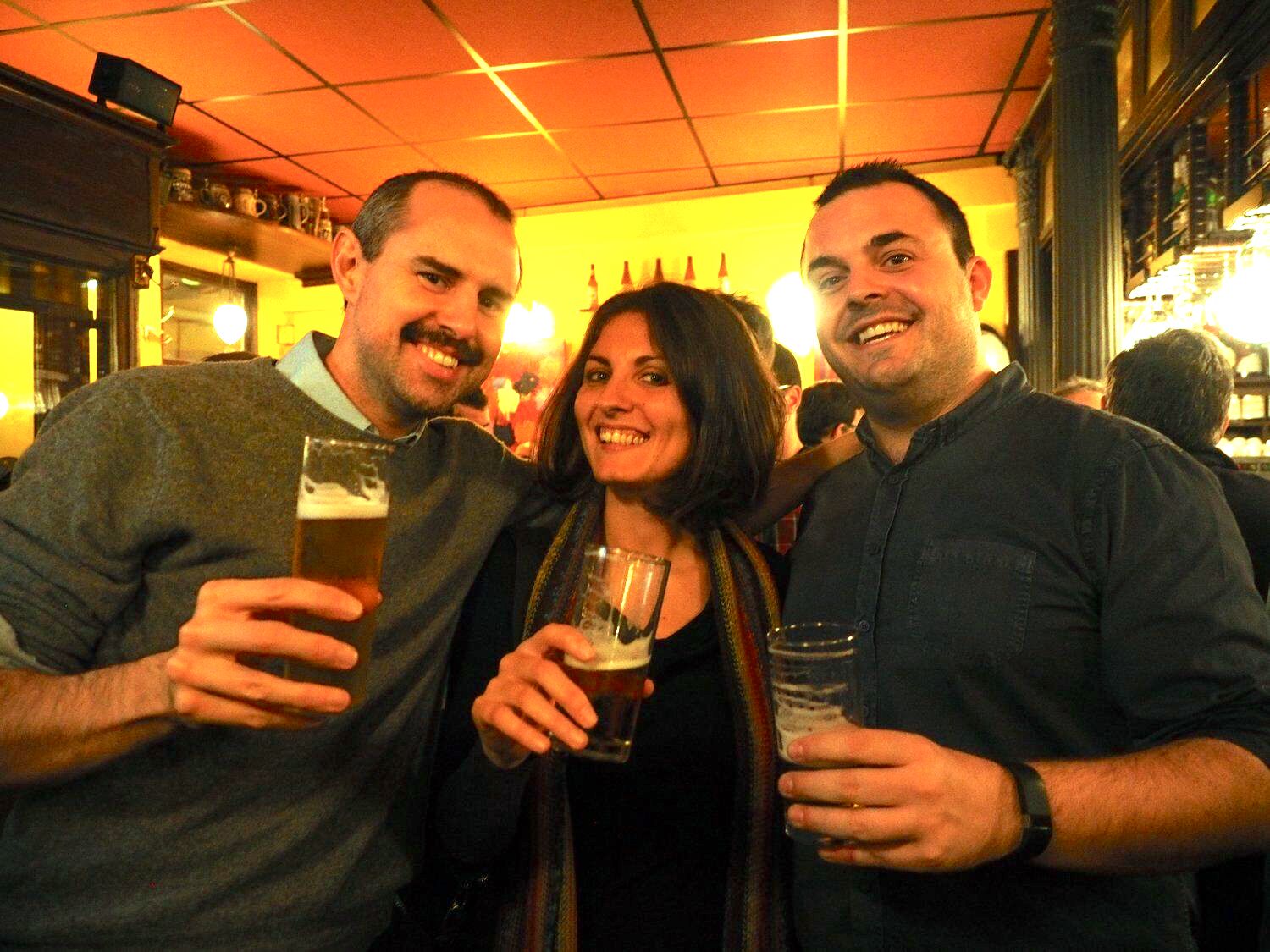
Marcelo Soria, Giovanna Miritello and Daniel Villatoro, founders of Databeers
In 5 years, you have grown in an extraordinary way, with branches in about thirty cities, many of them outside our borders. In your opinion, what are the reasons for success? What are the differences between Databeers and other events focused on disruptive data and technologies?
María: I think there are several reasons, apart from being an international community and a coordinated network, which always helps and enriches. First, Databeers organizes near and informal events, horizontal, in a relaxed atmosphere (sometimes in bars), in a schedule that allows to find a balance between work and family life, with beer and networking. And People, sometimes swamped with "suit and tie" and little interactive events, express their gratitude. The second reason is that the talks are high-quality with an informative tone, without technicalities, which makes them "affordable" and understandable for non-technical profiles, who now are also interested in learning about big data, data analysis, visualizations... In addition, many professionals with different profiles (marketing, journalism, tourism, public administration ...) and entrepreneurs have needs that can be meet by data. Our events allow people who have the questions to interact through networking, with specialized and technical professionals (developers, data analysts ...), who are the ones who can use the technology to implement solutions that answer those questions.
Hence - and this would be a third possible reason - communities such as Databeers Malaga have chosen to carry out thematic events, where the talks revolve around data applications in different disciplines. It was not really a premeditated strategy, but it has been done in part because the organizers of academic or professional macro events have invited us to make editions of Databeers under their wings. Some very interesting synergies (win-to-win), fruit of the prestige of Databeers that give more visibility to the community. And as a last reason, it should be notice that beyond the face-to-face events, we pay attention to social networks, interacting with the community and other actors, and we also pay attention to the generation of open and online knowledge through online repositories. Thus, for example, in Malaga, in addition to our space in Meetup and Twitter and Facebook profiles, we developed our own website, where -together with information from the community and events- we share all the images, presentations and recordings of the talks under Creative Commons license, thus enabling its use and reuse by any interested person. In the rest of the chapters, we also boost that knowledge persists to the extent of the resources that each city has. Many of the cities have a YouTube channel with recorded talks, for example, and some of them have also websites.
.
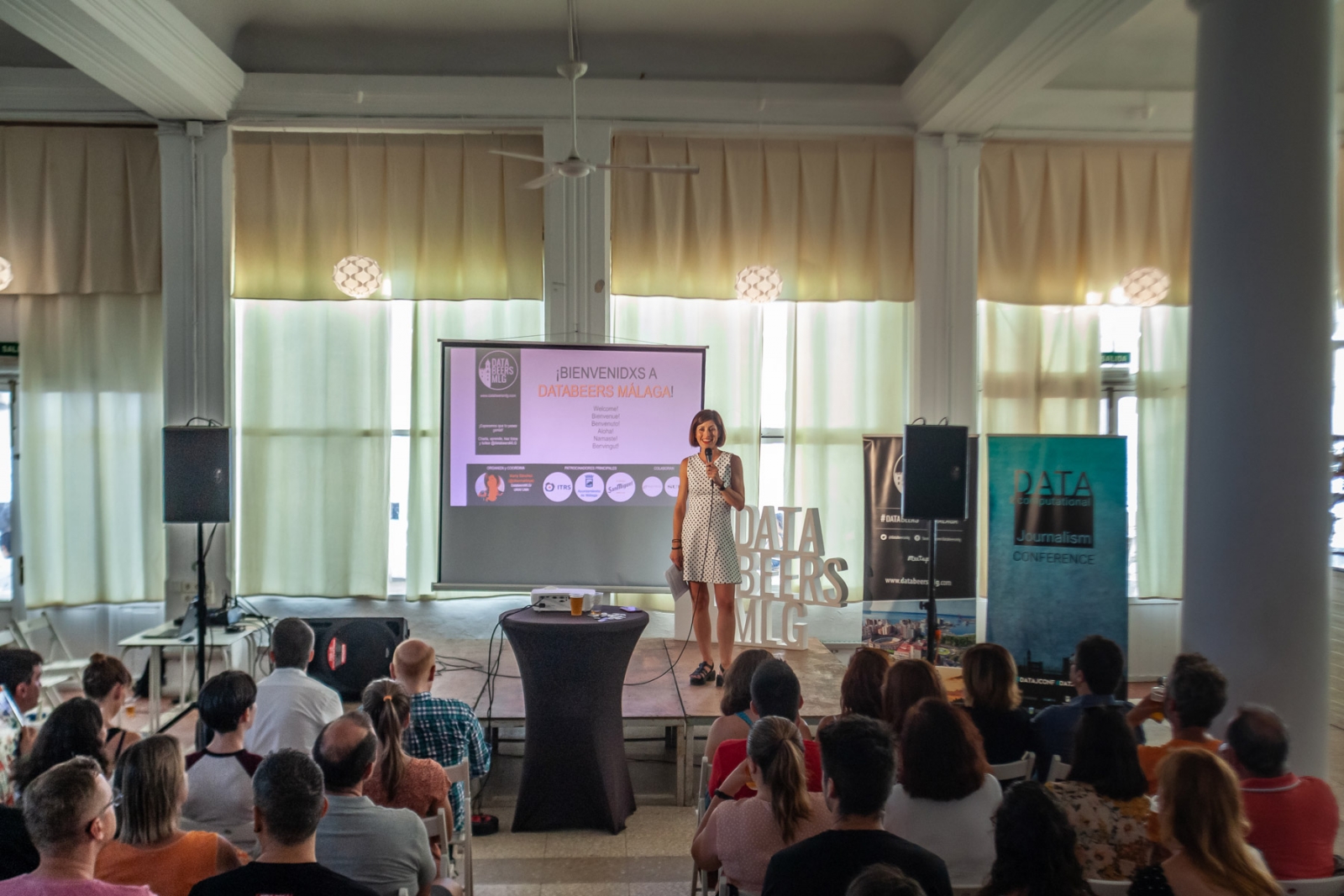
María Sánchez, organizer of Databeers Malaga. Photograph by Koke Pérez
What kind of audience usually attends your events? What are the areas within the data universe which most interest for the attendees?
Marcelo: Half or so are data practitioners, people who in one way or another have professional or technical knowledge related to this world: data analysts, data scientists, viewers, data engineers, etc. But we really like to see people coming from many other profiles, people who are outside the world of data but are curious. Lawyers, artists, businessmen, doctors, students, professionals, retirees and even young children who say “bravo!” in the middle of the speakers´ talk.
Talking about areas, issues related to privacy and data use tend to generate debate, as it could not be otherwise and especially in recent times in which there is a lot of media attention to what is happening. But the themes are very diverse and the public too, so there are talks about visualization, about open data, about data protection law, about how two researchers discovered that Beethoven's metronome was broken and many more examples. Each assistant has his own area of interest, and therein lies in part the success, as we have said: there is something for everyone, and always with a casual and very close perspective.
Some of the events you have organized have revolve around open data, such as Databeers Málaga Open Data. What do you think is the potential of open data in the current economic and social context? And what are the challenges to overcome?
María: Indeed, open data is part of the areas of interest of Databeers. In the case of Malaga, in addition to the 11th Databeers, which you mention and that was done within a technological macro-event, the OpenSouthCode, in June 2018, we have included talks on open data in subsequent events, such as the Special Greencities Databeers held in May 2019, which showed the potential of open data portals that many public administrations have been developing. Shortly before we also collaborated in the first open data reuse contest, organized by the Malaga City Council, a pioneer in this area. And on September 30, a special transparency and open government Databeers is planned that will also address open data projects, from a citizen and accountability perspective.
In my opinion, and I speak from the perspective of communication and education that is my sector, it is true that with the law of transparency and the culture of open knowledge we have many open data available, and that is certainly an opportunity, also for the professionals (think for example in data journalism). But on the other hand, apart from technical improvements of the open data portals, one of the biggest challenges lies, in my opinion, in the greater efforts that would have to be made to publicize the existence of these resources among the citizens. The so-called small data is not taking full advantage. And they will only be true useful open data when anyone can appropriate them to respond to their demands, having a more critical view of reality or improving their quality of life.
Marcelo: I agree with Maria, and I add that an additional challenge to the dissemination of these resources is to disseminate what can be done with them: how to use them, how to take advantage of them, how to combine with other disciplines to create useful products, services, solutions with a positive impact. It is not easy to formulate a problem well and understand how a given data set and specific techniques applied to them can help solve the problem. The part of formulating the problem (or determining the opportunity) is critical and we usually tiptoe around it. Understanding deeply that data is only a part of a solution, along with many other things, is complicated.
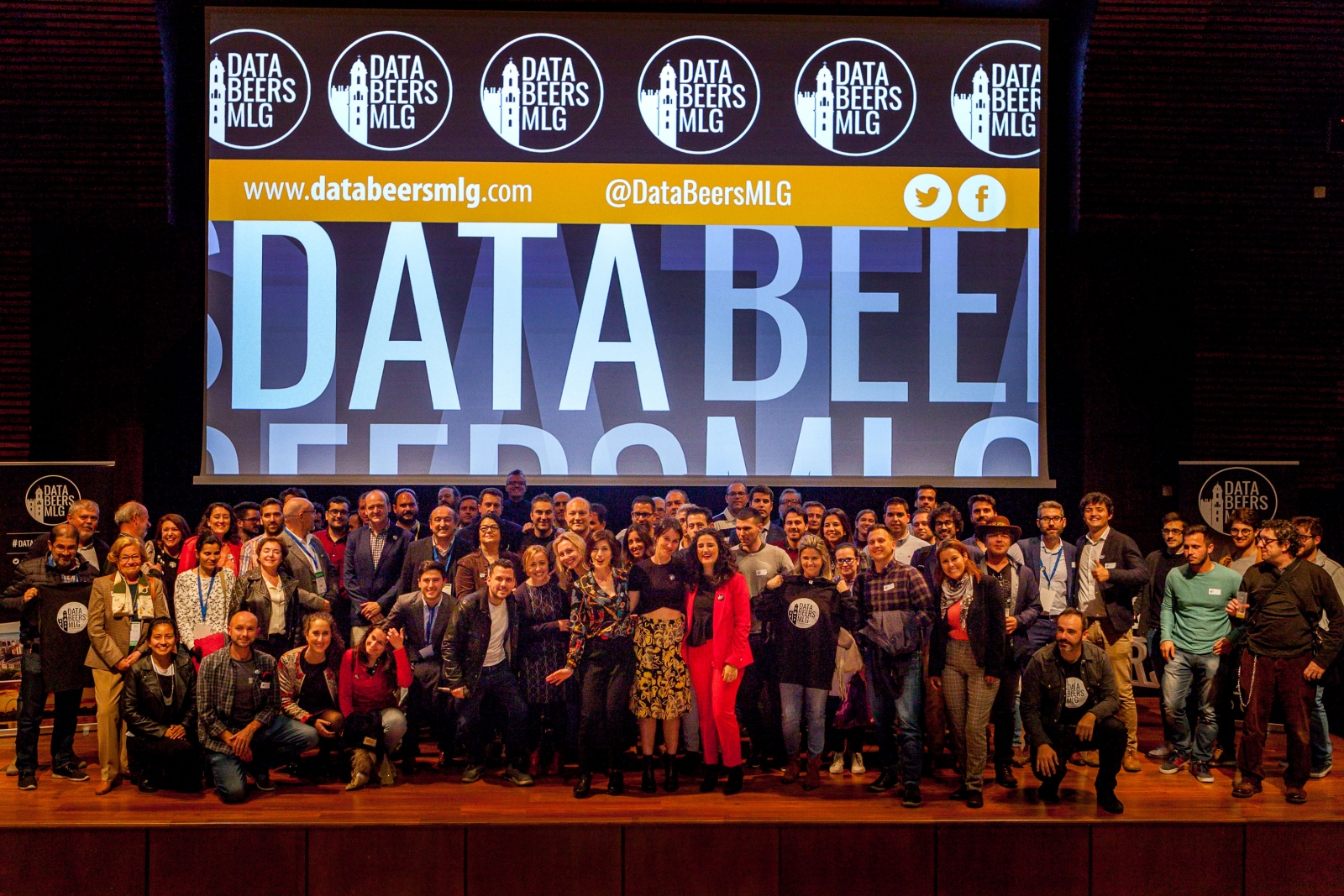
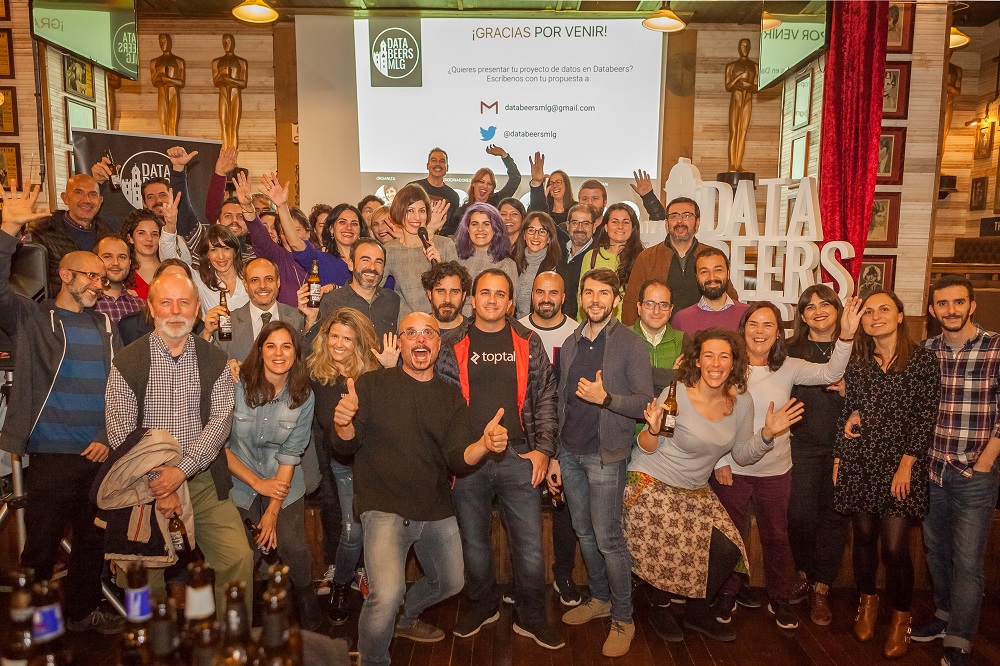
Last events Databeers Malaga. Photographs by Koke Pérez.
What data sets do you think are the most useful for professionals that are working with this raw material (developers, journalists, etc.)?
Marcelo: I don't think there are more useful or less useful data sets in general. Perhaps it can be argued that ingeneral the data sets that represent life (what we do, how we moves: how we transport ourselves, how we spend, what we read, what we think, how we interact, bus arrival times, etc.) are more useful than those that represent a static context (maps, school relations, bus lines, where the stops are) because they allow to know a changing world, and in that knowledge is the opportunity to create something that helps us to handle that change. But in reality, the important thing is to know well the problem that we want to solve, or know how to determine the opportunity we want to address, and the usefulness of the data will come derived from that objective. You always have to ask yourself first why we do something, what we want to achieve, and from that point, search and understand what data sets can help us. And what analysis techniques, as well as what other disciplines, have to be combined to achieve the final result.
What measures do you consider necessary to encourage the reuse of open data from public administrations?
María: As we already mentioned, citizen dissemination campaigns can be very interesting, aimed at non-technical profiles, accompanied by some training to know how to manage open data portals and take advantage of it. Perhaps, communities such as Databeers, or alliances between public administration and the university with basic and applied research projects that show interesting results using and reusing datasets, can also play a role in the future. I remember, for example, a project that Nuria Portillo, speaker of the Greencities Databeers and director of the Open Government Chair of the City Council of Valencia, told me about a student of statistics who, based on the data from the portal of this City Council, had shown that media can tell other kinds of stories.
Marcelo: Again, I agree with María. To add something, I think leading by example is interesting. Accompanying the dissemination of data, both open data and techniques for its use, with applications built on them, applications that have a clear utility and that are also reusable, can pave the way.
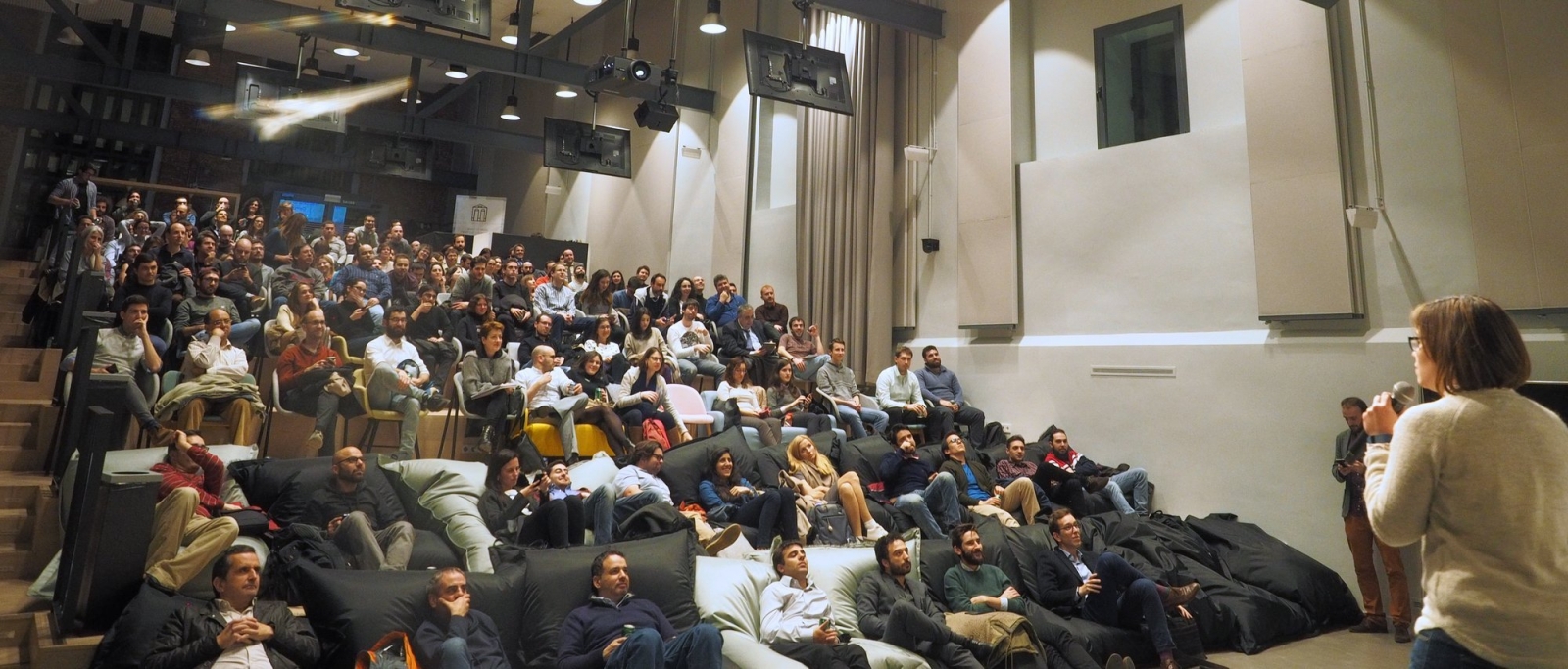
Databeers Madrid events. In the first image, Esteban Moro, professor at Carlos III University and MIT Media Lab. In the second image, Irene Rodríguez Luján, a UAM researcher and Senior Data Scientist at OpenBank.
Finally, can you anticipate what are the next events or projects that you are going to carry out?
María: We are at a point where Databeers has consolidated, and that implies a huge responsibility. We want to continue with the principles that define the community, of course, and the added value of, for example, publishing the talks online and maintaining our networked spaces. All this involves a great effort for the organization, which must be sustainable, and requires support in the form of sponsorships and collaborations, which are always welcome. In addition, the idea is to continue making synergies with other events to carry out thematic Databeers, or any other initiative to contribute, in short, to innovation and learning around a theme as essential today for any professional such as data.
Likewise, we want to continue promoting international growth, and make projects between several cities. We have ideas like a Databeers festival with representatives from all cities, or a cinematographic documentary that helps disseminate the data. Informative formats but also entertainment, informal as databeers style. For all this, we create a non-profit association in Spain that governs the finances of all the chapters and tries to channel these initiatives of greater importance.











